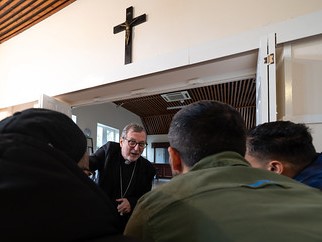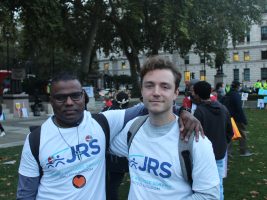
“The new refugee bill, the Nationality and Borders Act, is designed to exile asylum seekers to Rwanda, with utter disregard for their claims, and it punishes them for their plight, transferred here against their will, thereby exempting us from the duty to offer them reception. We are concerned about the new Prime Minister’s plans to reject asylum seekers.” Megan Knowles, deputy director of the Jesuit Refugee Service UK, does not mince her words of condemnation of the UK government’s controversial plan to deport asylum seekers to Rwanda. She called on “the new Prime Minister to scrap these cruel laws and create a system that is founded on dignity, humanity and justice.”
Fundamental rights. JRS UK is a leading player in the battle to ensure that political refugees receive food, money, English courses, as well as legal counsel to avoid deportation. It carries out this work in collaboration with other charities such as San Vincenzo De Paoli and Naccom, as part of a network of over 140 organisations working with migrants. One important outcome of this work was a halt to the first flight to Rwanda scheduled for June 14.
The legal battle was long and complicated but the flight was ultimately halted thanks to a decision by the European Court of Human Rights,
according to which the British government was violating the fundamental rights of an Iraqi man who would have faced a ”real risk of irreversible harm” had he been deported to the African country.
- Nunzio Gugerotti accoglie un rifugiato (Foto Jrs UK)
- Camminata per raccolta fondi (Foto: Jrs UK)
- Camminata per raccolta fondi (Foto Jrs UK)
“Hosting scheme”. Part of the JRS’ reception efforts is the ”JRS UK Hosting scheme”, a programme that provided political refugees and forced migrants arriving from Ethiopia, Pakistan, Nigeria and North Africa with a room in a London home for the past ten years. The guest and the host are introduced to each other, they agree on the conditions and sign a contract in which the guest can choose whatever conditions are most convenient to them. The Jesuit Refugee Service office in Wapping, east London, also houses a food bank and offers English courses and other study and volunteering opportunities to migrants who are
provided with food, clothes, mobile phones and credit cards, bus passes, advice and practical information.
Forced migrants and asylum seekers are interviewed when their legal refugee status has not yet been obtained and they cannot access benefits. The JRS helps them obtain the benefits they are entitled to. The Service assists these people by not making them feel alone, and by involving them in activities that diminish the isolation they experience.
A welcoming family. One family which has been taking in political refugees over the years is the family of Felicia, 64, and Bill Hughes, 70. She used to be the deputy headmaster of a school, he is an architect. The two, practising Catholics, are now retired and have decided to open the doors of their semi-detached house in Peckham, a trendy district in South East London, to political refugees and forced migrants from Nepal, Eritrea, Ethiopia, Pakistan and Algeria.
The couple is motivated by a strong Christian faith and by the belief that the British government is making life extremely difficult for asylum-seekers
who are not granted permission to work, rent a house or return to their countries of origin and remain caught in a limbo of poverty and lack of opportunities. Over the years, seven guests have been hosted in the two small rooms on the ground floor and two more on the first floor, whom Felicia and Bill have grown fond of and who have become part of their family.
Positive balance. Even though offering hospitality to asylum-seekers requires some sacrifice, because they are not allowed other guests and cannot be absent, they are repaid by the pleasure they feel in helping someone integrate in a country they do not know, giving them a new chance in life. For example, they recalled the story of a chef who insisted on cooking for them no matter what; a deaf-mute lady who didn’t speak English and didn’t know her ways around London, and would have gotten lost had they not helped her find her way back home every time. They have fond memories also of a homeless man who had been living outdoors, for three years. Over the years, their guests were always very respectful of their home, ready to help. However, Felicia and Bill never took advantage of this by assigning them only light chores that the guests were comfortable doing.
They find that the moment of departure is the most difficult aspect of this experience.
Every time a political refugee leaves, they feel heartbroken and vow not to take anyone in again. Nevertheless, after a few weeks, they are ready to start again because – they explain – these migrants are a source of great enrichment for them.














